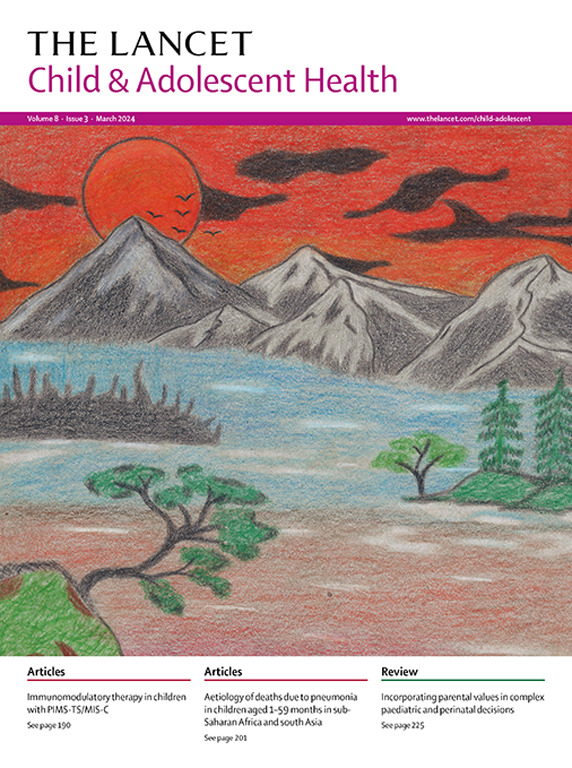180-day efficacy of nirsevimab against hospitalisation for respiratory syncytial virus lower respiratory tract infections in infants (HARMONIE): a randomised, controlled, phase 3b trial
IF 15.5
1区 医学
Q1 PEDIATRICS
引用次数: 0
Abstract
Background
Respiratory syncytial virus (RSV) is a leading cause of lower respiratory tract infection and hospitalisations in infants worldwide. The primary analyses of HARMONIE showed that nirsevimab reduced infant hospitalisations due to RSV-associated lower respiratory tract infection through the RSV season. This analysis aims to evaluate nirsevimab's efficacy at 180 days after dosing, a period exceeding the typical 5-month RSV season.
Methods
HARMONIE is an ongoing, open-label, parallel arm, randomised, controlled, phase 3b study conducted in France, Germany, and the UK. Infants aged 12 months or younger, born at a gestational age of at least 29 weeks, were randomly assigned (1:1) to receive either a single intramuscular dose of nirsevimab (50 mg for children <5 kg or 100 mg for children ≥5 kg) or standard care (without RSV prophylaxis) before or during their first RSV season. Randomisation was electronically done, stratified by country and age-group. The primary efficacy endpoint for this analysis was the incidence of hospitalisations due to RSV-associated lower respiratory tract infection up to 180 days after nirsevimab administration or randomisation in all randomised participants. Safety up to 365 days following nirsevimab administration was also assessed. This trial is ongoing and registered with ClinicalTrials.gov, number NCT05437510.
Findings
Between Aug 8, 2022, and Feb 28, 2023, 8057 infants were randomly assigned to either the nirsevimab group (n=4038) or the standard care group (n=4019). The median age at randomisation was 4·00 months (IQR 1·0–7·0; range 0·0–12·0, and 4195 (52·1%) were male and 3862 (47·9%) were female. Up to 180 days, 12 (0·3%) of 4038 infants in the nirsevimab group and 68 (1·7%) of 4019 infants in the standard care group had been hospitalised for RSV-associated lower respiratory tract infection, corresponding to a nirsevimab efficacy of 82·7% (95% CI 67·8–91·5; p<0·0001). Most participants experienced grade 1 (2759 [68·7%] of 4016 in the nirsevimab group; 2696 [67·1%] of 4018 in the standard care group) or grade 2 (1447 [36·0%] of 4016 in the nirsevimab group; 1436 [35·7%] of 4018 in the standard care group) treatment-emergent adverse events, and no apparent safety concerns were raised up to 365 days after dosing.
Interpretation
Nirsevimab offers consistent and sustained protection against hospitalisation due to RSV-associated lower respiratory tract infection for at least 6 months. This finding provides global health systems greater flexibility when implementing nirsevimab, providing substantial benefit in the ongoing effort to reduce the burden of infant RSV and the potential wider public health value.
Funding
Sanofi and AstraZeneca.
尼西维单抗治疗婴儿呼吸道合胞病毒下呼吸道感染的180天疗效(HARMONIE):一项随机、对照、3b期试验
背景:呼吸道合胞病毒(RSV)是全世界婴儿下呼吸道感染和住院的主要原因。HARMONIE的初步分析显示,在整个RSV季节,nirseimab减少了因RSV相关的下呼吸道感染而住院的婴儿。该分析的目的是在给药后180天评估nirseimab的疗效,这段时间超过了典型的5个月RSV季节。sharmonie是一项正在进行的、开放标签、平行对照、随机对照、3b期研究,在法国、德国和英国进行。出生在胎龄至少29周的12个月或以下的婴儿被随机分配(1:1),在第一个RSV季节之前或期间接受单次肌注剂量的尼罗昔单抗(5公斤以下儿童50毫克或5公斤以上儿童100毫克)或标准治疗(没有RSV预防)。随机化是通过电子方式进行的,按国家和年龄组分层。该分析的主要疗效终点是所有随机受试者在尼西维单抗给药或随机化后180天内因rsv相关下呼吸道感染住院的发生率。同时还评估了尼西维单抗给药后365天的安全性。该试验正在进行中,并已在ClinicalTrials.gov注册,编号NCT05437510。在2022年8月8日至2023年2月28日期间,8057名婴儿被随机分配到nirsevimab组(n=4038)或标准护理组(n=4019)。随机分组时的中位年龄为4.00个月(IQR为1.0 - 7.0;范围0 ~ 12.0,男性4195(52.1%),女性3862(47.9%)。在180天内,4038名婴儿中有12名(0.3%)因rsv相关的下呼吸道感染住院,标准护理组的4019名婴儿中有68名(1.7%)因rsv相关的下呼吸道感染住院,对应于尼塞维单抗的有效性为82.7% (95% CI为67.8 - 91.5;术;0·0001)。大多数参与者经历了1级(4016名中的2759名[68.7%]);标准治疗组4018例中有2696例[67.1%])或2级(尼塞维单抗组4016例中有1447例[36.0%]);1436例(标准治疗组4018例中的35.7%)出现了治疗中出现的不良事件,并且在给药后365天内没有出现明显的安全性问题。nirsevimab可提供至少6个月的持续保护,防止因rsv相关下呼吸道感染而住院。这一发现为全球卫生系统在实施nirseimab时提供了更大的灵活性,为正在进行的减轻婴儿呼吸道合胞病毒负担的努力提供了实质性的好处,并具有潜在的更广泛的公共卫生价值。资助赛诺菲和阿斯利康。
本文章由计算机程序翻译,如有差异,请以英文原文为准。
求助全文
约1分钟内获得全文
求助全文
来源期刊

Lancet Child & Adolescent Health
Psychology-Developmental and Educational Psychology
CiteScore
40.90
自引率
0.80%
发文量
381
期刊介绍:
The Lancet Child & Adolescent Health, an independent journal with a global perspective and strong clinical focus, presents influential original research, authoritative reviews, and insightful opinion pieces to promote the health of children from fetal development through young adulthood.
This journal invite submissions that will directly impact clinical practice or child health across the disciplines of general paediatrics, adolescent medicine, or child development, and across all paediatric subspecialties including (but not limited to) allergy and immunology, cardiology, critical care, endocrinology, fetal and neonatal medicine, gastroenterology, haematology, hepatology and nutrition, infectious diseases, neurology, oncology, psychiatry, respiratory medicine, and surgery.
Content includes articles, reviews, viewpoints, clinical pictures, comments, and correspondence, along with series and commissions aimed at driving positive change in clinical practice and health policy in child and adolescent health.
 求助内容:
求助内容: 应助结果提醒方式:
应助结果提醒方式:


